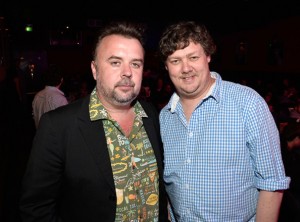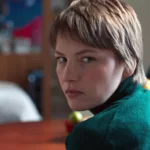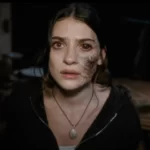It’s no secret what a tough business the film industry is. Any prospective writer or director knows that you’ll most likely spend years or decades getting your first film off the ground, if you are even lucky enough to accomplish such a feat at all. Especially here in Australia, your chances are slim to nil. For Cameron and Colin Cairnes, the years of hard work have paid off as their first feature film is opening in Australia and other countries around the world.
‘100 Bloody Acres’ is a fun gore-fest of a horror film, where Colin and Cameron almost seem to be playing for as many laughs as they are scares. For lack of being able to find a specific genre in which to categorise the film, I suppose ‘fun’ is an apt phrase, which it is genuinely refreshing to find among modern Australian releases.
The film puts a somewhat comedic spin on the outback psycho tale, focussing on a group of city folk who break down in the middle of nowhere and stumble upon the seemingly altruistic Reg (Damon Herrimen), a small town fertilizer proprietor who offers to give the trio of travellers a lift into town. Unfortunately as things unravel it becomes clear that Reg and his brother Lindsey (Angus Sampson) mean to spice up their family business’ wares by adding some a very human element into the mix.
Aiming for a very niche audience of the slasher-film-goers, the Cairnes brothers have a film on their hands which will definitely please their intended viewers. It’s a film that has already received a healthy dose of praise from various sources around the world – mostly from individuals and groups already squarely in the horror-enthusiast camp.
TOM Magazine’s Adam Harmer had the good fortune of meeting with this fresh Australian talent, having seen their outrageous film, not knowing what to expect, and found them both to be remarkably quiet, friendly and humble guys. We sat and discussed the status of Australian films, the nature of burgeoning artists and the difficulties of fitting a horror film into a specific sub-genre.
TOM: Thanks for talking to us, guys.
Cameron/Colin: Pleasure.
TOM: So this is your first film.
Colin: Feature film. Yes.
TOM: How’s that feeling right now? I imagine you’d be over the moon.
Cameron: Yeah. It’s very exciting. I mean, it’s taken a long time to get to this place.
Colin: We actually delivered it last year for the Melbourne International Film Festival, so we’ve kind of been sitting twiddling our thumbs waiting for this release. Now it’s finally getting out there. So, yeah. Very exciting.
TOM: So when did filming actually finish?
Cameron: Last year. It was a five week shoot…
Colin: January and February last year, and then we had about ten weeks to cut and mix it and it was delivered in June for the film festival.
Cameron: So it was a pretty tight turn around.
Colin: And that’s just how it works. Things take time. It just had its theatrical release in the states and all the VOD platforms as well.
Cameron: And Pirate Bay. (Laughter)
TOM: That’s the big one. The one that everyone watches for.
Colin: But not Brisbane.
TOM: We’re very honest people here.
Colin: Well, we’re from Brisbane…
TOM: So you know how it works.
Colin: We were here through the Joh years. (Laughter)
TOM: Other young film makers will be wanting to know; How do you get from the beginning stages of having the idea to this point?
Cameron: The two million dollar question. Um. It’s just perseverance. It really is. To get a film made in this country you rely largely upon government money and they’re just not going to give that to you straight off the bat.
Colin: You think they will. You write a script… When I think back on the first draft of this or the previous one we did and you think ‘It’s genius. They’ll love it. It’ll be up in a year.’ And you hear people in America say ‘How ever long you think it’s going to take – Double it.’ But here in Australia I’d say ‘How ever long you think it’s going to take – Double it, then add five years.’ So yeah. Like Cam says, it’s perseverance but it’s also honing your craft at every opportunity and get involved with good people. You know? Just work with good people and we were lucky enough to eventually find – Well, had a good producer find us. And that was key – just someone who knows the system and has those skills and knows how to handle the money and the budget.
Cameron: But yeah – just practicing. Whether that’s on corporate videos or commercials or whatever. Just honing your skills. I mean, we edited the film and we’ve shot stuff before and all these skills come into play. You need to have a handle on a number of those things. I mean when we’ve made short films on low or no budgets, we’re having to do art department or we’re having to act or any number of things and it just gives you a better understanding.
TOM: So you guys were doing short films for a while before this?
Colin: Yeah we’ve both done work – whether it was on the fringes of the industry. I’ve been overseas doing things or we’ve been editing or directing. But yeah. Ten years, I’d say, we’ve been doing short films.
Cameron: Ten years of doing it seriously – Putting stuff into festivals. But before that, in our teens and twenties we were making shorts but just for ourselves – For our own amusement and our friends would get a laugh out of it so we’d enter them into festivals like St. Kilda or Tropfest and then in 2002 we got two shorts into the London film festival. I think that was a bit of a breakthrough for us.
Colin: And we submitted for some travel money to go over there for it and that was a bit of a win – That we were now on their radar. We went over and we didn’t balls it up and we wrote a little report on it.
TOM: So were the shorts in a similar genre? The horror/comedy style?
Cameron: Not so much horror, but comedy. Yeah.
Colin: There was violence, but very playful films.
TOM: So the thing I always want to talk to other film makers about is the state of films in Australia…
Cameron: Yup. Let’s get out our handkerchiefs now.
TOM: I guess what the question comes down to, is what film makers think the problem with Australian film is. Because the elements seem to be there. We’ve got successful directors working overseas – Really successful actors working overseas. We have great crew in any number of roles working around the place. Why can’t we just get it all together?
Colin: It’s a good question. I just don’t know if there’s a good answer to that.
Cameron: I think probably it’s the taste-makers a bit.
Colin: I think it’s scripts.
Cameron: But that’s what I’m saying. Choosing the right scripts and developing them.
Colin: Yeah. The ‘ideas’ phase. Working out what projects are going to work. I think a lot of scripts are well written but are maybe lacking conceptually – And maybe haven’t had a lot of thought as to what the market is. Or not even necessarily the market, but how the audience will respond to it. We never really thought about the market with our film, but it was more ‘Are we entertaining ourselves? Are we entertaining the audience?’ I think it’s about getting good premises that will connect with people.
Cameron: I think there just has to be a good balance of all sorts of films. Good genre films, good dramas…
TOM: So who are the film makers who inspired you?
Cameron: On this film or in general?
TOM: Well, maybe just in general, because I think if someone has inspired you – even if it’s not necessarily in this genre – that will just shine through anyway.
Colin: Why? What did you pick up on?
TOM: Well, I want to hear your answer first. (Laughter)
Cameron: We find ourselves watching a hell of a lot of Hitchcock – and I mean, he really made the first horror/comedies.
TOM: That’s right. It’s interesting you say that. I always hear people talk about his films as thrillers and horrors but I think the thing that people forget – and are reminded of when they go back to watch them – is that his films are hilarious. And people try to emulate his films and they make these deathly serious, dark film noirs.
Colin: Sure. I mean there aren’t many laughs in ‘Vertigo’, but for the most part, yeah.
Cameron: There’s usually a very cheeky sense of humour.
Colin: Yeah. So there’s the tone that inspired us but also I think there’s some redundant overhead shots we stole from ‘Vertigo’.
TOM: Was that when he’s walking around the truck?
Colin: We did a series of them but that was the only one that stayed in the cut. But other influences…
Cameron: (Steven) Spielberg. Like his early eighties films. We have a bunch of those classic Spielberg reveals. (Brian) De Palma’s in there a bit too, I think. And a few of those guys from the early eighties like (Joe) Dante or (John) Landis. … ‘American Werewolf’.
TOM: I was actually going to mention ‘American Werewolf in London’ as a possible influence.
Colin: Definitely. In terms of the heightened tone of it – Mixing the laughs with the gore.
TOM: Yeah. For both films I’d say there are a lot of moments that aren’t necessarily comedy, but more light-hearted horror. It’s a bit of ‘It’s not necessarily a joke. It’s actually really grim, but I’m having fun with it.’
Cameron: Yeah. Not necessarily big jokes. It’s more the characters who are so likeable…
TOM: They manage to turn this horrific thing into an adventure.
Colin/Cameron: Adventure horror.
Colin: For ages we were trying to define the sort of horror film it was.
Cameron: Adventure horror?
TOM: Another influence I thought of – it might be a bit obvious – but maybe the Coen brothers?
Colin/Cameron: Yeah. Sure.
TOM:: I mean, I know every time there is a thriller with some light element or tongue in cheek humour people cite those guys. But what it actually was here, for me, was knowing of Angus Sampson from previous work – mostly comedic. In this film he’s really scary. He seems to have a silent gravity to him that reminded me of Peter Stormare from ‘Fargo’.
Cameron: He’d love to hear that.
TOM: Yeah. I’m used to seeing him in comedic or jokey roles and he’s quite different in this.
Cameron: I think he’s been under-utilised in the past. He’s really very talented and diverse. He just relished the role. I don’t think he’s played a bad guy before.
Colin: But, the Coens are probably in there. I remember – That was when I was back in Brisbane – I remember wagging school to go and see ‘Raising Arizona’.
TOM: Yeah. That was my first too.
Colin: But they’ve certainly been an influence. ‘Raising Arizona’ or ‘Fargo’.
TOM: So from here, do you have any ideas for the next one?
Colin: We’re hoping we do get to make another one. (Laughter) We’re still working with Julie Ryan who produced ‘100 Bloody Acres’ and she’s as good as anyone else in the business. So we’re very lucky to be working with her and we’re working on a script now and we’ll start looking for financing and we’re starting to talk casting.
TOM: Is it also based in Australia?
Cameron: Yeah.
Colin: It has a similar energy to ‘Acres’ but it’s more of an ensemble cast. It’s a bit of a genre-mash up – not so much horror. It’s more of a crime caper/comedy but with moments of violence…
Cameron: Designer violence.
TOM: Great. Well, thanks for talking to us guys. Good luck with everything.
Colin/Cameron: Thanks.
‘100 Bloody Acres’ opens around Australia in selected theatres on August 1st.




